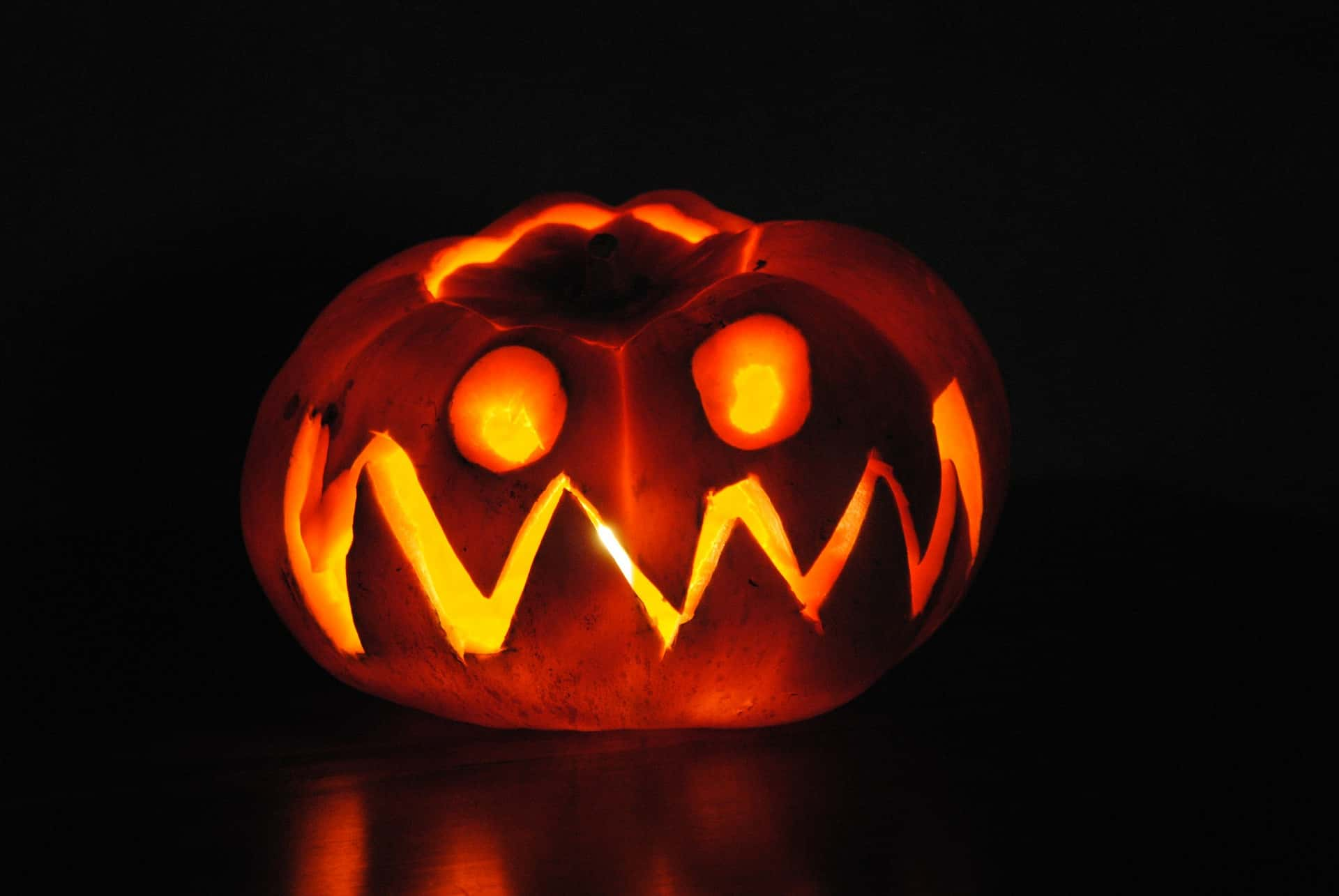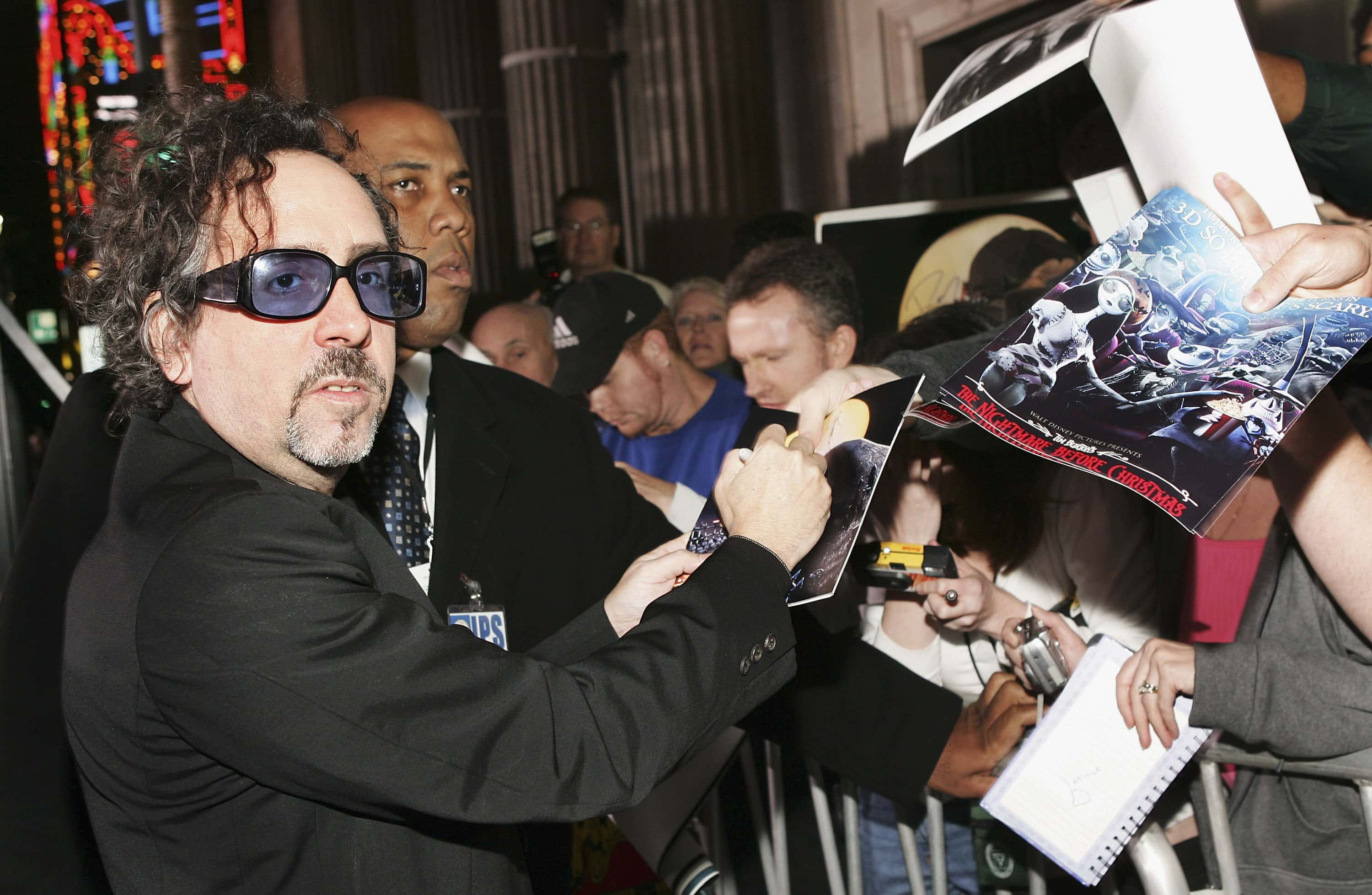“Forgive me, Mr. Claus. I'm afraid I've made a terrible mess of your holiday.” —Jack Skellington
Since its release in 1993, The Nightmare Before Christmas has wowed audiences with its never-before-seen blend of holiday warmth, grisliness, and unique animation style. Possibly just as fascinating as the film are the behind-the-scenes details that ultimately brought the dark tale to life.
The Nightmare Before Christmas Facts
24. I’ll Take the Pumpkin, Please
In a scene that was ultimately changed, vampires playing a macabre version of ice hockey chuck around a decapitated head that shares Tim Burton's spiky dark hair, pale skin, and angular features. The final version swapped out the familiar head for a jack-o-lantern—probably for the best; it is a kid's movie.
23. A Clash of Kings
As the imagination powerhouse behind the film, Tim Burton pulled from his own childhood experience to bring the holiday-themed towns to life. Burton recalled the perpetual sunshine of his younger years in California, where holidays were marked by shopping décor rather than seasonal changes. In California, like in the film, Halloween and Christmas clashed in store aisles stocked to accommodate a range of shopper needs.
22. A Strategic Suit-Up
Burton may have made the original framework for character design, but it was ultimately director Selick who brought Jack Skellington as we know him to the screen. Skellington started off dressed all in black, but Selick added that famous white pinstripe touch to his suit. A bonus? Camera tests found that Jack’s original attire blended in with the nighttime scenery, but with a little dash of strategically placed white, the Pumpkin King fairly sparkled on screen.
21. An Authentic Omission
Jack Skellington is aptly named considering that he is, in fact, a skeleton. However, this fact did not stop Walt Disney Studios from voicing some serious concerns about the film’s creepy vibes. The biggest offender seemed to be Jack's soulless gaze. Although Disney argued for the skull head to include a pair of relatable (and on-brand) peepers, Selick and Burton’s design ultimately stayed true to the original. (And we love Jack, empty-socketed skull and all).
20. All in the Details
A challenge was hidden in a relatively small scene. When Jack approaches the Christmas door, the shiny door knob catches his reflection. The angle and lighting manipulations required to create this detail proved to be one of the film’s greatest artistic challenges.
19. A Musical Jump-Ahead
Due to the film’s long production times using stop-motion, the animators worked ahead of time as much as possible. While the script was still in the works, composer Danny Elfman gave animators the green light to start on his musical numbers (which, obviously, he had to write before the script was finished!). "What’s This?" became the first song brought to life with animation.
18. Perfectionists Need Not Apply
Remember those wonky, not-quite-real shapes found all over the scenery in Halloween Town? To easily create the creepy, other-worldly characters and settings in the film, artists were directed to draw with their non-dominant hand.
17. Art Inspiring Art
Burton’s imaginings for the film can also be found in a poem he had written years before he pitched the idea to Disney. Here’s an excerpt from his “The Nightmare Before Christmas”:
Against the moon a skeleton sat,
alone upon a hill.
He was tall and thin with a bat bow tie;
Jack Skellington was his name.
16. The Numbers Game
The demands for stop-motion required a crew of more than 100 working on the film for over three years. Each second of footage featured 12 stop-motion moves.
15. The Man Behind the Mask
Originally, villain Oogie Boogie held a secret meant to be revealed at the film’s end: Rather than being filled with insects, tearing away his costume would have revealed Dr. Finkelstein, Sally’s evil creator.
14. There’s Something About Sally
There’s no doubt that Jack’s character struck audiences, but screenwriter Caroline Thompson notes that lovelorn Sally played a crucial role as well. “While Jack’s dilemma gives The Nightmare Before Christmas its plot,” Thompson stated, “Sally’s gives it its heart.”
13. Always the House of Mouse
Disney is famous for hiding its iconic classic character, Mickey Mouse, throughout its parks and films. Sure enough, even The Nightmare Before Christmas features a hidden nod to the Mouse. In one scene, two children are shown decked out in sets of pajamas with prints of Mickey Mouse and Donald Duck. There is even a flying, razor-toothed stuffed animal that bears an eerie similarity to Mickey.
12. So Long, Patrick
Patrick Stewart was originally set to narrate the film’s opening and close, but his voice work was ultimately cut from the final take. You can still find him on the official soundtrack!
11. First Time’s the Charm
The film has made it into cult-classic fandom, so it’s not surprising that Disney was eager to pitch a sequel and swap the laborious stop-motion method for CGI. Burton, however, turned down the idea. Slow your roll, Disney.
10. A Musical Connection
In addition to composing the film’s musical numbers, Danny Elfman also lent his singing voice to Jack. In fact, Chris Sarandon was cast as Jack because his speaking voice sounded like Elfman's singing voice.
9. The Personal Touch
While it may seem like Elfman had a huge workload, he claims that the work of writing the film’s 10 songs was a breeze. “I had a lot in common with Jack Skellington,” Elfman explains. Let’s hope that, unlike Jack, the poor man had at least experienced Christmas before adulthood.
8. A Very Shiny Nose
What is a hero without an adorable and trusty sidekick companion? Zero, Jack’s ghost dog, warms the hearts of viewers and seems even cuter upon closer inspection—his nose is a tiny, glowing jack-o-lantern. Better than his Christmas counterpart, Rudolph? You be the judge.
7. All About That Bass
Just when it seems that composer Elfman could not be any more immersed in the film, he strikes again: Elfman’s likeness cameos as a small man stuck inside the bass of the street band player. This guy really loves his work.
6. A Future Cut Short
It turns out that Jack could have had a happily-ever-after: In the extended ending, Santa Claus visits Jack sometime down the road and discovers he is the father of several skeleton children.
5. Lands Yet Unexplored
Although shown only briefly, seven holiday lands are identifiable based on a series of symbols found on the doors: Halloween (a pumpkin); Christmas (a decorated tree); Thanksgiving (a turkey); Easter (a colored egg); St. Patrick’s Day (a four-leaf clover); Valentine’s Day (a heart); and presumably Independence Day (marked by red and white fireworks). With this array of unexplored Burton-verses, can we really blame Disney for dreaming of a sequel?
4. Halloween Trickery
Considering the intense hands-on approach required for stop-motion animation, it isn’t that surprising to discover that the crew had some creative tricks up their sleeves. Just like you would expect in a haunted land, the set was full of trapdoors—these allowed hidden hands to manipulate character movements as needed.
3. Behind Those Empty Eyes
The amount of work needed to alter characters’ expressions is mind-blowing: Jack alone had 400 heads with different expressions on them.
2. The (Other) Man Behind the Curtain
Let's get this one out of the way first: Although The Nightmare Before Christmas is nearly synonymous with Tim Burton’s name, the famous director does not hold the lead title in this classic flick. Instead, directorial credit goes to the lesser-known Henry Selick, an old Disney colleague of Burton’s. At the time, Burton was too busy with Batman Returns to pull double directing duty.
1. Dream Bigger
On the film’s commentary track, Burton claims that the idea for The Nightmare Before Christmas was rattling around in his brain for at least 20 years before it became a reality in 1993. Ironically, it took him some time because he didn't dream big enough: Burton pitched his tale to TV studios and pictured it as a TV movie that would play annually for the holidays. It wasn’t until he proposed a full feature film that Touchstone/Disney took on the now-beloved holiday flick.

